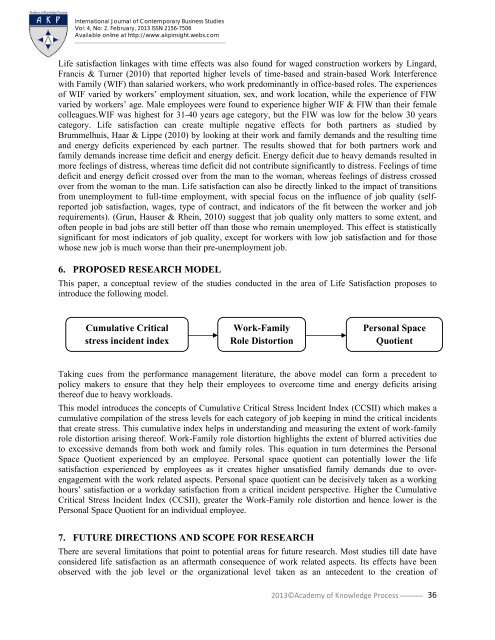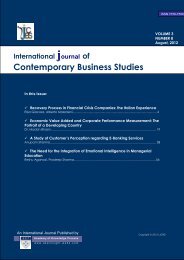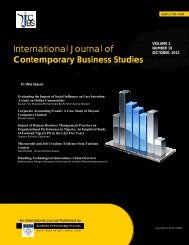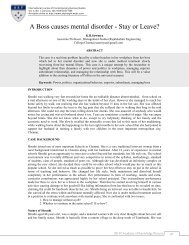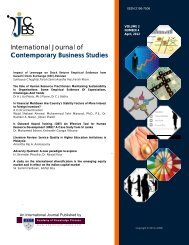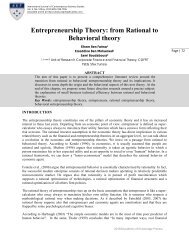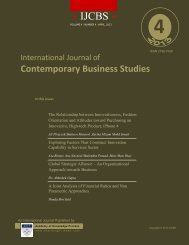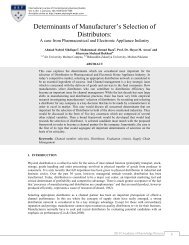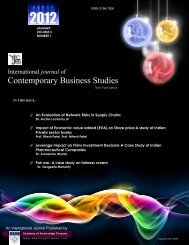Contemporary Business Studies - Academy of Knowledge Process ...
Contemporary Business Studies - Academy of Knowledge Process ...
Contemporary Business Studies - Academy of Knowledge Process ...
You also want an ePaper? Increase the reach of your titles
YUMPU automatically turns print PDFs into web optimized ePapers that Google loves.
International Journal <strong>of</strong> <strong>Contemporary</strong> <strong>Business</strong> <strong>Studies</strong>Vol: 4, No: 2. February, 2013 ISSN 2156-7506Available online at http://www.akpinsight.webs.comLife satisfaction linkages with time effects was also found for waged construction workers by Lingard,Francis & Turner (2010) that reported higher levels <strong>of</strong> time-based and strain-based Work Interferencewith Family (WIF) than salaried workers, who work predominantly in <strong>of</strong>fice-based roles. The experiences<strong>of</strong> WIF varied by workers’ employment situation, sex, and work location, while the experience <strong>of</strong> FIWvaried by workers’ age. Male employees were found to experience higher WIF & FIW than their femalecolleagues.WIF was highest for 31-40 years age category, but the FIW was low for the below 30 yearscategory. Life satisfaction can create multiple negative effects for both partners as studied byBrummelhuis, Haar & Lippe (2010) by looking at their work and family demands and the resulting timeand energy deficits experienced by each partner. The results showed that for both partners work andfamily demands increase time deficit and energy deficit. Energy deficit due to heavy demands resulted inmore feelings <strong>of</strong> distress, whereas time deficit did not contribute significantly to distress. Feelings <strong>of</strong> timedeficit and energy deficit crossed over from the man to the woman, whereas feelings <strong>of</strong> distress crossedover from the woman to the man. Life satisfaction can also be directly linked to the impact <strong>of</strong> transitionsfrom unemployment to full-time employment, with special focus on the influence <strong>of</strong> job quality (selfreportedjob satisfaction, wages, type <strong>of</strong> contract, and indicators <strong>of</strong> the fit between the worker and jobrequirements). (Grun, Hauser & Rhein, 2010) suggest that job quality only matters to some extent, and<strong>of</strong>ten people in bad jobs are still better <strong>of</strong>f than those who remain unemployed. This effect is statisticallysignificant for most indicators <strong>of</strong> job quality, except for workers with low job satisfaction and for thosewhose new job is much worse than their pre-unemployment job.6. PROPOSED RESEARCH MODELThis paper, a conceptual review <strong>of</strong> the studies conducted in the area <strong>of</strong> Life Satisfaction proposes tointroduce the following model.Cumulative Criticalstress incident indexWork-FamilyRole DistortionPersonal SpaceQuotientTaking cues from the performance management literature, the above model can form a precedent topolicy makers to ensure that they help their employees to overcome time and energy deficits arisingthere<strong>of</strong> due to heavy workloads.This model introduces the concepts <strong>of</strong> Cumulative Critical Stress Incident Index (CCSII) which makes acumulative compilation <strong>of</strong> the stress levels for each category <strong>of</strong> job keeping in mind the critical incidentsthat create stress. This cumulative index helps in understanding and measuring the extent <strong>of</strong> work-familyrole distortion arising there<strong>of</strong>. Work-Family role distortion highlights the extent <strong>of</strong> blurred activities dueto excessive demands from both work and family roles. This equation in turn determines the PersonalSpace Quotient experienced by an employee. Personal space quotient can potentially lower the lifesatisfaction experienced by employees as it creates higher unsatisfied family demands due to overengagementwith the work related aspects. Personal space quotient can be decisively taken as a workinghours’ satisfaction or a workday satisfaction from a critical incident perspective. Higher the CumulativeCritical Stress Incident Index (CCSII), greater the Work-Family role distortion and hence lower is thePersonal Space Quotient for an individual employee.7. FUTURE DIRECTIONS AND SCOPE FOR RESEARCHThere are several limitations that point to potential areas for future research. Most studies till date haveconsidered life satisfaction as an aftermath consequence <strong>of</strong> work related aspects. Its effects have beenobserved with the job level or the organizational level taken as an antecedent to the creation <strong>of</strong>2013©<strong>Academy</strong> <strong>of</strong> <strong>Knowledge</strong> <strong>Process</strong>36


